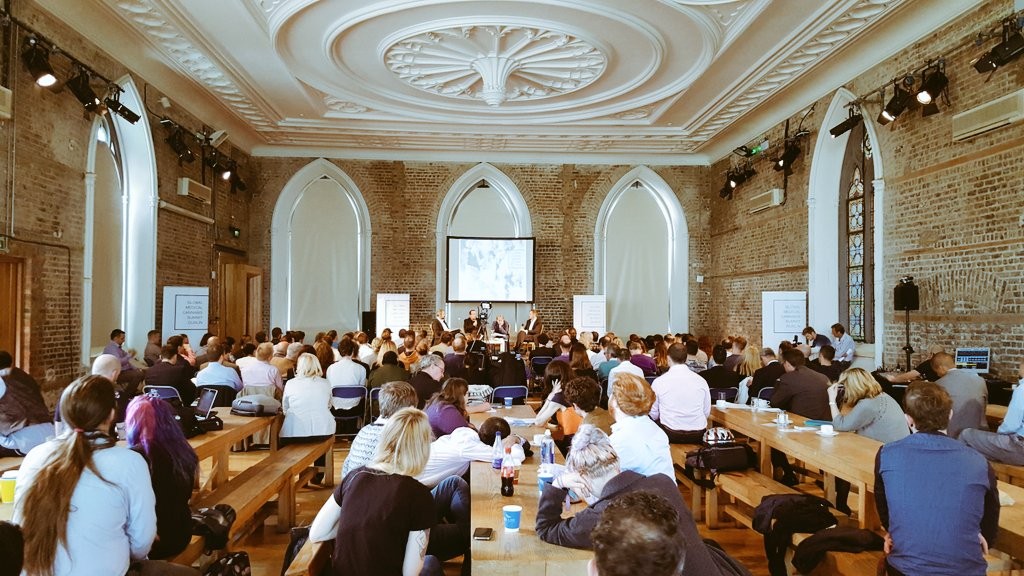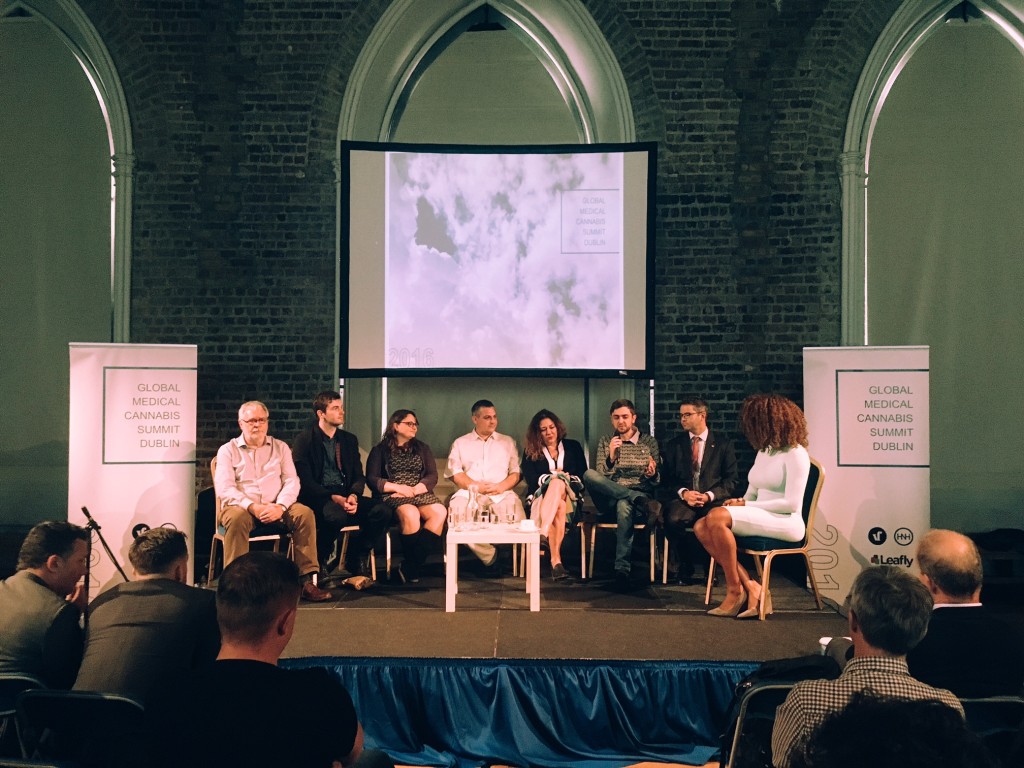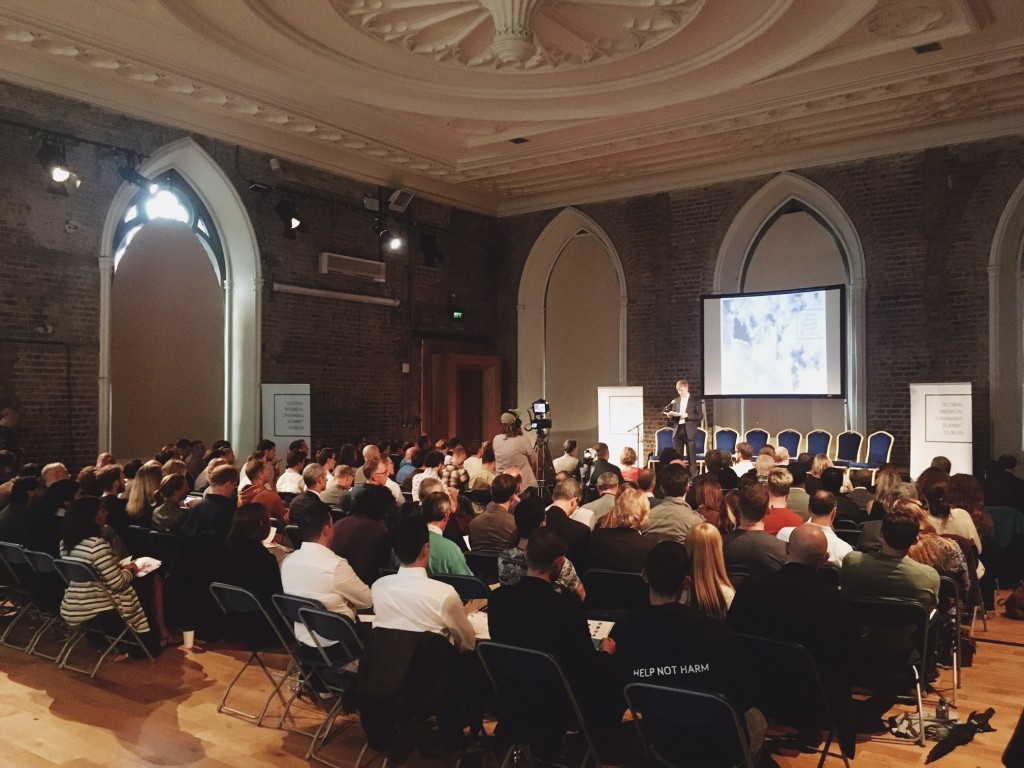With memories of the Global Medical Cannabis Summit: Advancements in the Age of Cannabis still fresh in our minds, VolteFace has been particularly fortunate to receive the following in-depth review of the event – penned by Dr Callum Swift, who graduated with an MA in Neuroscience from Trinity College, Dublin.
On a sunny September day in Dublin, the historic Smock Alley Theatre played host to the inaugural Global Medical Cannabis Summit. The event was the brainchild of VolteFace and Help Not Harm, and promised to ‘bring together world experts from science, public policy, business and campaigning to explore emerging new innovations in medical cannabis.’ The timing could not have been better, coming a day after the publication of the long awaited report on access to medical cannabis from the All-Party Parliamentary Group for Drug Policy Reforms in the UK.
Despite the burgeoning body of evidence supporting the use of cannabinoids for a variety of neurological and psychiatric conditions, five years of medical undergraduate education in Ireland and a years postgraduate study in neuroscience did not impart upon me even the faintest glimmer of scientific knowledge about the subject, my opinions on the matter being informed largely as a part of a broader agreement that the decriminalisation of most drugs would be a rational and desirable thing. So I went into the conference not quite sure what to expect, but exited at the prospect of gaining a more nuanced understanding of the topic to better support my views on drug policy at large.
Despite my initial amusement at the wonderfully clichéd sight of a dreadlocked hippie smoking a joint at nine in the morning, whilst queuing to get into a conference on cannabis legalisation, it quickly became clear looking down the impressive list of speakers that this was a very serious affair; senior policy makers from several European countries, chief scientists, CEO’s, TV personalities and lifelong pro-cannabis activists, all passionate about the need for reform in cannabis legislation around the world.
Indeed, the opening speaker was Dr. Mike Barnes, author of the aforementioned All-Party Parliamentary report. Barnes’ team found, through an extensive literature search of over twenty thousand published papers, that there was good quality and conclusive evidence supporting the efficacy of cannabis in treating a wide range of disorders, from chronic pain to spasticity. Thus they concluded that the inclusion of cannabis as a schedule 1 drug (the schedule for substances with no medical value) is no longer sustainable, and they recommended it be moved to a schedule 4, allowing easier research and prescription by doctors. Notably they also recommended the decriminalisation of home growing of small quantities of cannabis for medical use. The full report is available online and is well worth a read.

The inaugural Global Medical Cannabis Summit gets underway in Smock Alley Theatre, Dublin. (Source: VolteFace)
Dr. Catherine Jacobson, chief scientist at Tilray, followed on from this talk with an even more detailed account of the current direction of research in the area, and interestingly made the a distinction between two groups of disorders that benefit from treatment with cannabis derived compounds, the ‘therapeutic group’, containing conditions like chronic pain, anxiety, insomnia, and the ‘pharmacologic’ group containing disorders like intractable epilepsy and glioblastoma. Her logic for the division was that the first group tend to be symptom control issues in long term disorders, highly variable among individuals, for which exact dosing schedules and pharmacokinetics is less important than the ability for patients to take the lead in adapting their own treatment in a way that works for them. In the latter group, which include life threatening and fast moving diseases such as glioblastoma (a very aggressive form of brain cancer), disease modification is the aim and there is not the luxury of time for patients to try out a variety of different compounds, they need high level evidence based medicine with exact pharmacokinetics and dosing schedules. This division was echoed somewhat throughout the day, with some spirited debate arising between the campaigners, many of whom were long term medical cannabis users themselves, and the various heads of cannabis growing companies, pharmaceutical firms, business leaders and the like, who were proponents for a more scientific and tightly controlled approach, and is something I will touch on again at the end.
The morning session was rounded off by an incredibly animated and passionate Dr Arno Hazekamp, chief scientist at Bedrocan, a large Dutch medical cannabis growing company, who supply directly to the Dutch government and many other governments around the world. Arno took us through the fascinating and complicated process of cannabis growing, from the conditions required to produce batch after batch of pharmaceutical grade cannabis to the rigorous quality control and testing that they perform to ensure their different strains have consistent levels of the various active cannabinoids.
The second panel discussion of the day was chaired by Tim Colbourne, former deputy chief of staff to Nick Clegg during his time as deputy prime minister, and was centered around international models of medical cannabis policies. Speakers included senior policy makers from Germany, the Czech republic and Croatia. Dr. Ingo Michels, head of the Office of the Federal Drug Commissioner In Germany, discussed the draft legislation that he has brought to the German parliament, which aims to make medical cannabis available on prescription, and crucially, funded by health insurance companies. One of the highlights of the day was Dr. Ognjen Brborovic, chairman of the Committee for Medical Cannabis in Croatia, grinning widely as he explained how he rushed through legislation legalising medical cannabis in his country in a meager nine months, from conception to adoption in law, on the back of a widely recognized EU loophole. The magic ingredient, he said, is political will: ‘When you have it, capitalise on it, because you never know how long it will last for!’
A change of scene saw a larger panel discussion between several renown advocates, discussing cannabis campaigning in the mainstream media. The session was chaired by the charismatic Charlo Greene, who famously quit her job as a news anchor live on air and began a career dedicated to campaigning for legal access to medical cannabis. The session brought a very personal element to the discussion, with many of the speaker’s long-term users of medical cannabis themselves. Particularly moving was Tom Curran’s account for caring for his terminally ill wife, who in the advanced stages of Multiple Sclerosis came to depend on cannabis as her only effective reprieve from crippling muscle spasms. The inhumanity of forcing people such as him to break the law in order to care for his dying wife was obvious to all present, and the risk that many of these people have to take was highlighted graphically by Charlo Greene’s admission that she faces many years in jail for her role in setting up the Alaska Cannabis club, if she loses her upcoming trial.
An impassioned plea from a member of the crowd, Vera Twomey, to have the Irish government allow her to access medical cannabis for the treatment of her daughter Ava’s rare form of intractable epilepsy was widely applauded, and fittingly the People before profit TD Bríd Smith then took to the stage to announce the tabling of new Legislation that has been introduced in the Dáil (the Irish Parliament) to allow the use of cannabis and cannabis-related products for medical purposes, through the provision of a cannabis regulation authority. He said his driving motive was hearing stories such as Ava’s, and admitted that when he embarked on the project he had, like many people, a false and misinformed view of what medical cannabis was and why it was used, but that every day he researches it he become more and more convinced that legalising it is the right thing to do.
The final session was focused on the evolution of the cannabis industry, and brought together a diverse group of business leaders and patient advocacy group leaders. As I mentioned earlier there was some interesting debate among the panel, with Charlo Greene (Alaska Cannabis club) and Valeria Corral (executive director, Wo/Men’s Alliance for Medical Marijuana) arguing for complete deregulation of home-grown cannabis to allow easy access to all, and Tjalling Erkelens (CEO of Bedrocan) and Dr. Shane Morris (Quality assurance and Scientific Affairs, Hydropothecary) eloquently defending the need for strict research and development of pharmaceutical grade products.
I think the concern of the former two was borne out of fear that the regulation and monetisation of medical cannabis would suppress the grassroots, community cannabis club model of holistic patient-centered care, and the argument of the latter being that sick patients deserve to be able to purchase a reliable supply of quality assured, pharmaceutical grade products that have consistent dosing profiles. These two differing angles of the same problem very much reflect Dr. Jacobson’s two ‘therapeutic’ and pharmacologic’ groups. On the one hand we have a drug that has been used for medicinal purposes for thousands of years, is easily grown for very little expense at home, and has an excellent safety profile and a wealth of anecdotal evidence about its benefit for a broad variety of long term conditions. Combined with the fact that many of these conditions are notoriously hard to treat with conventional medicine, it’s easy to see why this model of home grown, patient directed care is so passionately supported by those who have benefited from it.
On the other hand, as Dr. Mike Barnes highlighted at the beginning, when your goal is to persuade governments to change their health policy and criminal laws, anecdotal evidence and grassroots pressure needs to be combined with irrefutable scientific proof and for that you need the rigorously controlled production, extraction and independent testing that allows for the high quality studies required to inform policy makers.
What the day demonstrated most to me was how important it is for all these elements to act synergistically together to help drive policy reform. Grassroots movements like Americans for Safe Access help garner publicity and provide political pressure. The emotional pleas from parents and partners like Vera Twomey and Tom Curran who have run out of options for their loved ones provide an important personal aspect to the debate and helps to change the misconception about who medical cannabis users are and why they choose cannabis. The meticulous research that the likes of Dr. Arno Hazekamp and Dr. Catherine Jacobson carry out helps add weight to the expanding body of high quality scientific research supporting the use of cannabis for a growing number of conditions. And together, all of the above help policy influencers like Dr. Mike Barnes and policy makers like Dr. Ingo Michels change the law, helping millions of people to alleviate their suffering in a legal, safe and dignified way.
With a rapidly growing list of over twenty countries including Canada, Germany, Spain, Portugal and parts of the USA either decriminilising cannabis, legalising medical cannabis, or both, what’s clear is that the question is no longer will medical cannabis be made legal, but when.
Dr Callum Swift is a junior doctor specialising in emergency medicine. He completed his medical degree and a Masters in neuroscience at Trinity College Dublin, and is now living and working in London.


